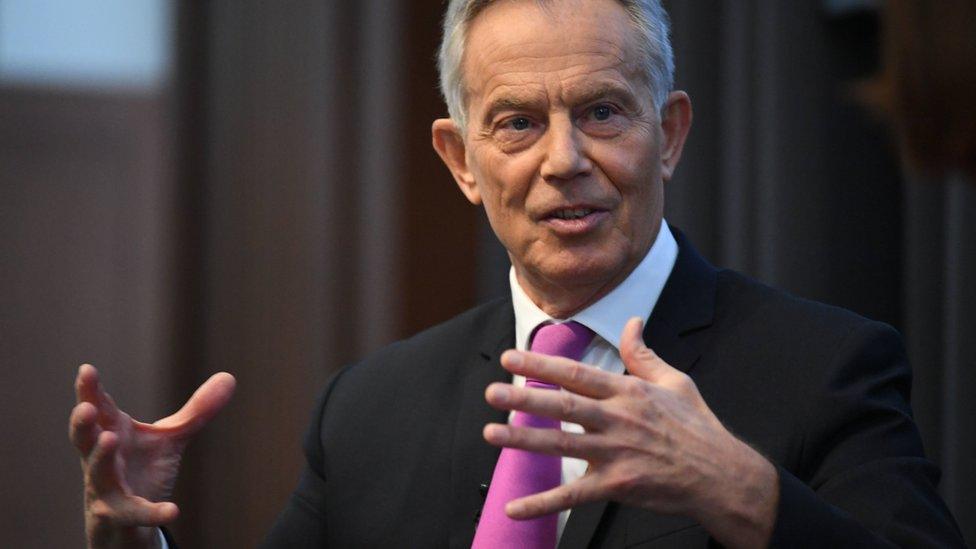Tony Blair: Labour needs 'total deconstruction' to win power
- Published

Tony Blair led Labour to victory in 1997
The Labour Party needs "total deconstruction and reconstruction" to win back power, Tony Blair has said.
Writing in the New Statesman, external, the former prime minister praised Sir Keir Starmer as an "intelligent, capable [and] moderate-minded" person.
But he warned a new leader alone would not achieve "the miracle renaissance" the party is looking for, calling Sir Keir "sensible but not radical".
The comments come in the aftermath of a bumper set of elections across the UK.
Labour lost control of eight councils in England, as well as losing the Hartlepool by-election, as the results rolled in over the weekend.
The party fared better in Wales - where it retained control of the Senedd under Mark Drakeford - and it won 11 out of 13 mayoral races in England.
But a messy reshuffle and rows over the removal of deputy leader Angela Rayner as the party's campaign coordinator led to further criticism of Sir Keir's leadership.
Speaking to the BBC on Tuesday, Ms Rayner said voters "didn't know what [Sir] Keir Starmer stood for" during the elections.
But she said she believed in him "100%", adding: "I wouldn't still be working with him if I didn't."
Meanwhile, former Labour leader Jeremy Corbyn said he did not take responsibility for the results, and voters "didn't feel confident in what the policy offer was" from the party.
Speaking to ITV's Calling Peston podcast, Mr Corbyn - who has been suspended as a Labour MP under Sir Keir - he said there was a feeling Labour "had done too much agreeing with the government" over its Covid-19 strategy.
When it was put to him that the current leadership had been blaming him for the results, he replied: "I think it's a bit rich to start blaming me for stuff that's been done over the past year that I've had absolutely no part of whatsoever.
"I do think that dumping on somebody because they're not there anymore is a bit weak really."
'Reasonable' opposition
Mr Blair led the Labour Party to victory in 1997 after 18 years on the opposition benches, and he won a further two elections in 2001 and 2005.
After he stepped down as prime minister in 2007, his Chancellor, Gordon Brown, took over. But when the public returned to the polls in 2010, Labour was voted out.
In his article, the former PM praised Sir Keir's election as leader - saying he had replaced "a classic protest politician completely unsuited to leadership, let alone to governing" in Jeremy Corbyn.
He said Sir Keir had taken a "strong stand against the stain of anti-Semitism" and had provided a "reasonable" approach to opposition during the Covid crisis, but was "struggling to break through with the public, and last week's elections are a major setback".
"At present, Labour expresses perfectly the progressive dilemma," said Mr Blair. "[Jeremy] Corbyn was radical but not sensible. [Sir] Keir seems sensible but not radical.
"He lacks a compelling economic message. And the cultural message, because he is not clarifying it, is being defined by the 'woke' left, whose every statement gets cut-through courtesy of the right."
'A new progressive movement'
Mr Blair said the best way forward was to "search for a new governing coalition... building out from the centre ground".
He said "progressive parties" - naming Labour, the Greens and the Liberal Democrats - "must modernise their economic message" as well as finding a "unifying social and cultural message" - something he claims Conservative parties across the West have already achieved.
The ex-PM added: "Without the diverting drama of speculation around new political parties, we need a new progressive movement, a new progressive agenda and the construction of a new governing coalition.
"The construction of this new progressive movement should start with an open dialogue between like-minded Labour and Lib Dem members and the non-aligned."
Angela Rayner: I have a 'very frank' relationship with Starmer
Another former Labour leader, Ed Miliband, gave his support to Sir Keir, saying it was not time to "blow the final whistle" on his leadership.
But he told BBC Radio 4's Today programme the party should be "bolder" with its economic proposals.
Mr Miliband, who was brought back to the frontbench as shadow business secretary, added: "We propose a £30bn green infrastructure plan [and] absolutely we should be doing that. [But] we should be bolder, of course we should be bolder.
"This country needs big economic change, that's what Keir Starmer believes in. He believes we are an unfair, unequal and unproductive country, and that's got to change.
"Now that is the right thing for the country and the right way to unite our coalition."
Ahead of an online rally for MPs and activists on the left wing of the Labour party, MP Richard Burgon called for the Labour leadership to support policies put forward by Labour at the 2019 general election.
He said: "It's clear that we did badly in these elections because voters didn't know what the Labour leadership stands for. If we don't have a bold vision for the country, then we really can't expect voters to back us. "In poll after poll, our progressive policies from recent manifestos are much more popular than the party itself."